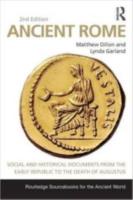
Routledge (2nd edn., 2015) p/b 854pp £29.99 (ISBN 9780415726993)
Anyone who has used the first edition of this volume will welcome this revised and extended version. The historical range has expanded to include the period from the death of Caesar to the death of Augustus; in addition the social history chapters now include material from this period. These chapters remain basically the same (with the addition of ‘sexuality’ to ‘Women and the Family’). The two new sections cover the rise of Octavian and the principate of Augustus. In the contents, the chapter headings have been expanded with sub-sections. This makes identifying the material easy to find. There are introductory essays to each chapter and much shorter explanatory notes to documents (reduced in size from the first edition owing to the scope of the additional material now included).
D. and G. have provided updated bibliographies and an extensive general index and one of ancient sources, plus a glossary (now at the beginning of the book), and abbreviations of personal names (always useful!). A brief guide to citing sources will be particularly helpful to those new to the subject.
The new chapters 14 and 15 (‘Octavian’s rise to power’ and ‘The age of Augustus’) feature not only the standard sources such as Plutarch and Suetonius but also Cassius Dio, Appian, Cicero’s Letters and Nicholaus of Damascus. There are sources which are less easy to access, including speeches, poetry, inscriptions and coins. Chapter 14 deals with the chronological events from the second triumvirate to the first settlement of 27 BC. The extracts chart clearly the issues faced by both Octavian and Antony and the course towards Actium. ‘The age of Augustus’ is especially interesting its variety of contemporary and later sources as well as extracts from the Fasti; there are sections on the Augustan laws bringing together useful accounts and views, Augustus’ family and friends, the imperial cult, slaves, freedmen, family life as well as sections on the constitution and politics.
This new volume is a welcome reference book for anyone interested in the history of the republic and Augustus. The translations are accessible and clearly designed for the general reader as much as for the teacher or student. It provides an excellent introduction to the study of sources, offering knowledge and understanding of a range of documents and authors across a wide spectrum.
Terry Edwards—Maidstone
